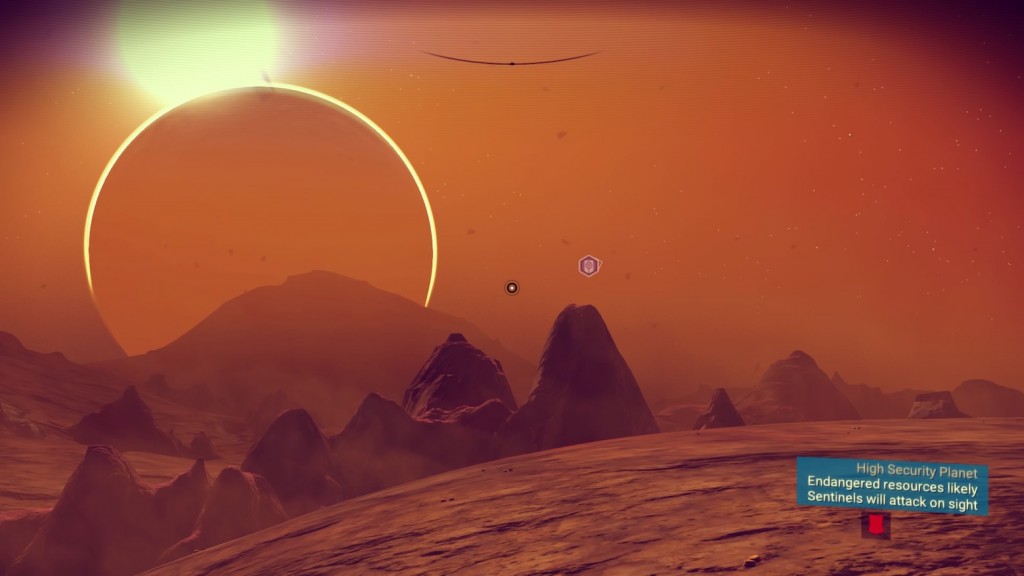No Man’s Sky – the other side of the fence
It’s not often a video game captures so many people’s imaginations prior to its release, and then ends up challenging many gamers to think about what actually drives us to play games. I have partaken in my fair share of navel gazing leading into writing this review, as I have a hard act to follow.
Koru-Cottage’s very own Richard wrote a great ‘Non-Review’ HERE, outlining his feelings on this much anticipated PS4/PC exclusive. I now have the unenviable job of taking up the Ying, to his stunningly written Yang!
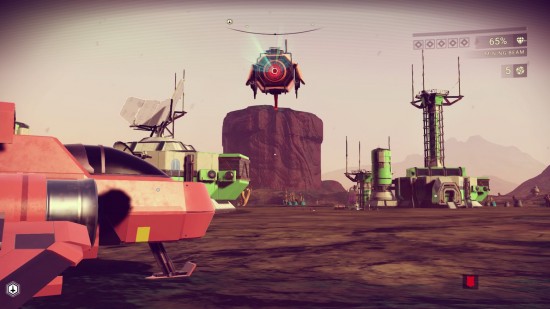 So, I’m just going to come right out and say it. I didn’t enjoy playing No Mans Sky. That’s not to say that I don’t appreciate what the relatively small development team at Hello Games have achieved. The promise of exploring literally quintillions of planets with unique features and lifeforms was, to a sci-fi nutter such as myself truly alluring.
So, I’m just going to come right out and say it. I didn’t enjoy playing No Mans Sky. That’s not to say that I don’t appreciate what the relatively small development team at Hello Games have achieved. The promise of exploring literally quintillions of planets with unique features and lifeforms was, to a sci-fi nutter such as myself truly alluring.
The game does have a few minor technical problems, some poor user-interface choices, and rubbish combat. But it’s beautiful and the audio throughout does imbue a wonderful sense of being lost in space. My thoughts on No Mans Sky though, are less on the classic review, ‘good vs bad’ design aspects, and more on why No Mans Sky didn’t capture my attention the way I wished it had.
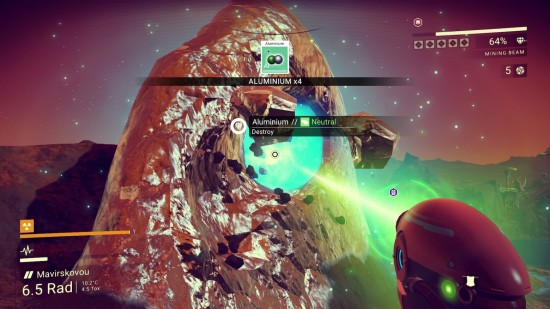 After an initial star-scape loading screen, the game opened onto a beautiful looking world that I appeared to have crashed landed on. As my ship needed repairs, over the next hour or so subtle guidance was given on what actions to take. Elements needed to be collected/mined on the planet’s surface, to craft the items required to get my ship off the ground and space worthy again. I really enjoyed the credit the developers gave me as a gamer, as the hand holding during this tutorial period was minimal.
After an initial star-scape loading screen, the game opened onto a beautiful looking world that I appeared to have crashed landed on. As my ship needed repairs, over the next hour or so subtle guidance was given on what actions to take. Elements needed to be collected/mined on the planet’s surface, to craft the items required to get my ship off the ground and space worthy again. I really enjoyed the credit the developers gave me as a gamer, as the hand holding during this tutorial period was minimal.
How to use my mining laser, manage storage and understand recipes was all left to me to figure out. Freedom of choice throughout was a clear design decision by Hello Games. Just choosing a direction and heading off over the horizon and into the unknown was initially a real thrill. It really did feel like I was the first person to ever set foot on ‘my’ planet. I spent a few hours exploring ‘my’ planet, naming animals and plants, finding abandoned outposts and gathering new mods and recipes. But this began to be repetitive and I felt I pretty much knew ‘my’ planet. So, I blasted off into space to see what else this solar system had to offer.
 Turns out….it was more of the same. The next planet I landed on looked just like ‘my’ planet, but red. With the same outposts, same rolling terrain and more scattered alien artefacts to scan. To start with I sought out every alien relic I could find, as they help with very basic language puzzles.
Turns out….it was more of the same. The next planet I landed on looked just like ‘my’ planet, but red. With the same outposts, same rolling terrain and more scattered alien artefacts to scan. To start with I sought out every alien relic I could find, as they help with very basic language puzzles.
But after learning a good amount of the alien language Gek on ‘my’ planet, it was with great disappointment that when I did my first Warp Jump to a new star system. I found that all my work had been for nothing. There was a whole new language to grind away on for little reward. Suffice is to say, after a few hours doubt and boredom began to creep in.
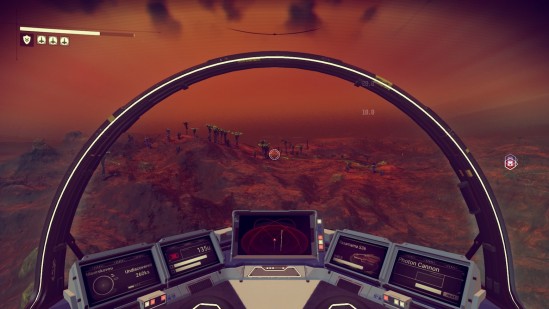 No Mans Sky was not the deep space adventure I had hoped for, but a game with much freedom and little substance. With no true narrative to drive me onwards, interesting characters to search out or gameplay techniques to master, the only reward for pushing on was to explore the next planet. However, the literally endless ability to explore, appears to technically limit what can actually be built into the game.
No Mans Sky was not the deep space adventure I had hoped for, but a game with much freedom and little substance. With no true narrative to drive me onwards, interesting characters to search out or gameplay techniques to master, the only reward for pushing on was to explore the next planet. However, the literally endless ability to explore, appears to technically limit what can actually be built into the game.
Each new planet feels hollow and the activities and resource gathering eventually feels like busy work. Each time I visited a new planet, the idea of ‘player freedom vs classic video game paradigms’, created a nagging thought at the back of my mind. I felt that this endless array of galaxies was all just filler. Full of repetitive work and planets that lacked the subtleties that are afforded through intelligent design.
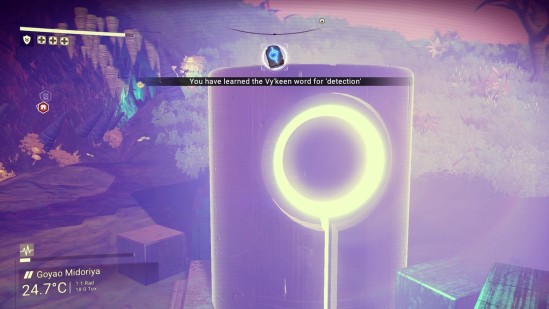 At the games core is an ongoing resource gathering and crafting loop, which has a cosmetic overlay to give the illusion of ‘new and unusual’. However, whether I was gathering Zinc on planet #2 or Platinum on planet #12, the core game was exactly the same. Sure, mathematical variables may have been moved on whatever algorithmic sliders are running under the hood, to make the surrounding terrain green and bushy, or rocky and toxic. But I was still going to the same outpost buildings, finding more minerals to build or sell and upgrade my gear to….do what? More of the same!
At the games core is an ongoing resource gathering and crafting loop, which has a cosmetic overlay to give the illusion of ‘new and unusual’. However, whether I was gathering Zinc on planet #2 or Platinum on planet #12, the core game was exactly the same. Sure, mathematical variables may have been moved on whatever algorithmic sliders are running under the hood, to make the surrounding terrain green and bushy, or rocky and toxic. But I was still going to the same outpost buildings, finding more minerals to build or sell and upgrade my gear to….do what? More of the same!
The lack of substance and purpose seems to be why gamer voices on the internet have expressed frustration. For me, I need story, gameplay variations and the temptation of something amazing round the corner to drive me onwards. The only overarching exposition is a goal of getting to the centre of the universe. But that seems so far away and the repetition required to get there meant that for me personally, it would not be a fun endeavour.
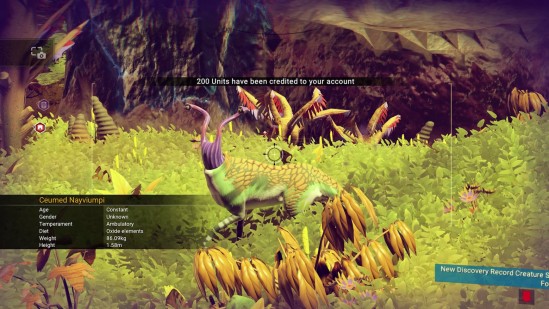 No Mans Sky developer Hello Games are certainly clever and have clearly made the game they wanted too, which is to be commended. They will undoubtedly have a loyal niche audience who will enjoy endless of hours of exploration for years to come. However I can’t help but feel that this is a technologically impressive ‘Indie’ title, which Sony has over sold. I do hope that this technology finds its way into the hands of a Bioware or a Bethesda type developer. A developer who can bring more than just maths to their games, but also a sense of place and purpose.
No Mans Sky developer Hello Games are certainly clever and have clearly made the game they wanted too, which is to be commended. They will undoubtedly have a loyal niche audience who will enjoy endless of hours of exploration for years to come. However I can’t help but feel that this is a technologically impressive ‘Indie’ title, which Sony has over sold. I do hope that this technology finds its way into the hands of a Bioware or a Bethesda type developer. A developer who can bring more than just maths to their games, but also a sense of place and purpose.
Unfortunately the perceived promise of No Mans Sky and the actual realities of the mathematical algorithms driving its world building, drove a wedge between my hopes for the title and my needs as a video gamer.


